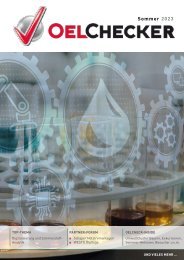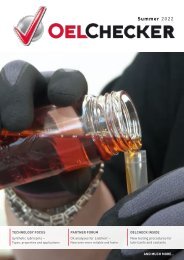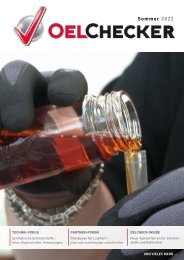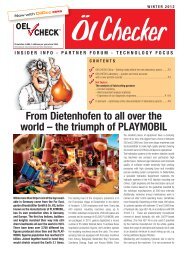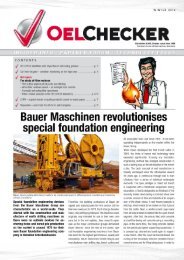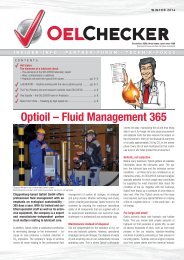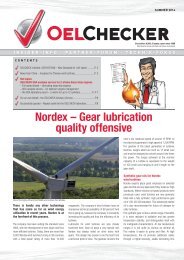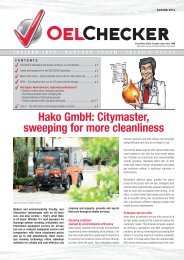OELCHECKER - Spring 2012
> Putzmeister - offering quality worldwide > Analysis kits and gas-tight sample bottles for refrigeration compressor oils > More playtime fun - thanks to OELCHECK! > 2012 customer survey results > The viscosity robot - the new OELCHECK laboratory assistant > Underground maintenance - K+S KALI GmbH workshops > Electrostatic discharges in hydraulic oils and lubricants > Question time: Could lengthy storage times have an influence on your oil samples? > and much more...
> Putzmeister - offering quality worldwide
> Analysis kits and gas-tight sample bottles for refrigeration compressor oils
> More playtime fun - thanks to OELCHECK!
> 2012 customer survey results
> The viscosity robot - the new OELCHECK laboratory assistant
> Underground maintenance - K+S KALI GmbH workshops
> Electrostatic discharges in hydraulic oils and lubricants
> Question time: Could lengthy storage times have an influence on your oil samples?
> and much more...
- No tags were found...
You also want an ePaper? Increase the reach of your titles
YUMPU automatically turns print PDFs into web optimized ePapers that Google loves.
OELCHECK INSIDER INFO<br />
Optimised analysis kits and gas-tight<br />
sample containers for refrigeration compressor oils<br />
Our test procedures selected for analysing oils from refrigeration compressors have<br />
proven themselves time and time again over the years. However, we have further<br />
optmised the tests, our laboratory equipment and the sample containers for these<br />
products yet again. It‘s not just the users of modern synthetic refrigeration machine<br />
oils who are benefiting!<br />
New analysis kits VK1 and VK2 for refrigeration compressor oils identify:<br />
• Wear metals: iron, chrome, tin, aluminium, nickel, copper, lead and molybdenum<br />
• Additives: calcium, magnesium, zinc, phosphorus, barium, boron and sulphur<br />
• Contaminants: silicon, potassium, sodium and lithium<br />
• PQ index<br />
◦ Oxidation<br />
• Optical check (colour change, visible particles)<br />
◦ Special outgassing process<br />
• Viscosity at 40°C and 100°C as well as the viscosity index ◦ Water content according to<br />
Karl Fischer<br />
In addition to the tests above for analysis kit VK 2:<br />
Neutralisation Number (NN) or Acid Number (AN) or Base Number (BN)<br />
Refrigeration compressor oils should lubricate, minimise<br />
friction, protect from wear and corrosion, cool,<br />
clean, prevent deposits and create a seal or reduce<br />
any leakage flow in the compression chamber. However,<br />
for the most part they also come into direct<br />
contact with the refrigerating agent. A refrigeration<br />
machine oil therefore has to work in harmony<br />
with it as much as possible. Impurities from seal<br />
materials or negative impacts from moisture or even<br />
water are one of the criteria for an oil change or<br />
additional oil servicing measures. The temperatures<br />
during compression of the gaseous refrigerating<br />
agent of up to 120°C can significantly accelerate<br />
oil oxidation, hence its ageing. During an oxidation<br />
process, mostly acids form in the oil which can have<br />
a corrosive effect on the compressor components,<br />
particularly if there is any residual moisture.<br />
The production capacity of the refrigeration compressor<br />
oil and its interaction with the refrigerating<br />
agent have decisive effects on the service life of the<br />
compressor. Therefore, regular lubricant analyses<br />
are vital. They provide information on the condition<br />
of the oil and the complex chemical reactions that<br />
have taken place in the compressor oil. If necessary,<br />
any potential damage and disruptions to operations<br />
can be counteracted.<br />
There are special OELCHECK analysis kits for the<br />
extremely important task of monitoring refrigeration<br />
compressor oils. When the test processes in the kits<br />
were compiled, not only were our experience and<br />
the recommendations of previous compressor and<br />
oil manufacturers taken into consideration, but also<br />
the specifications of work group E-DIN 51503-2.<br />
NEW<br />
Acids or bases in refrigeration machine<br />
oils<br />
The Neutralisation Number (Acid Number or AN)<br />
provides information on the level of mineral acids as<br />
well as water-soluble and insoluble organic acids in<br />
a refrigeration compressor oil. Mineral acids, such<br />
as hydrochloric or hydrofluoric acid, are formed<br />
through the decomposition of halogen refrigerating<br />
agents or upon interaction with the refrigeration machine<br />
oil. Organic acids result from the oxidation of<br />
refrigeration machine oils and the decomposition of<br />
ester oils. All of these acids lead to the corrosion of<br />
the metallic materials in refrigeration systems, promote<br />
oil ageing and cause unfavourable changes in<br />
the electrical isolation values of motor compressors.<br />
The Base Number (BN) provides information on<br />
the level of alkaline substances in the oil. They<br />
are caused by oxidation in ammonia refrigeration<br />
systems in the case of thermal loading. Inside the<br />
compressor they lead to oil silting and on the hot<br />
side, in pressure chambers<br />
and on valves, to<br />
carbonaceous deposits.<br />
Top tip: If you want to learn more about<br />
refrigeration machines and their oils, read the<br />
article „OELCHECK analyses keep refrigeration<br />
machines fit“ in ÖlChecker Summer 2008 at<br />
www.oelcheck.de.<br />
New sample containers<br />
With pre-paid kits VK1 and VK2 for oils from refrigeration<br />
compressors, from now on, customers<br />
are provided with newly designed gas-tight 100 ml<br />
sample containers made from shatter-proof glass<br />
with a metal lid. They are suitable for all oil types<br />
and refrigerating agents. In addition, they can withstand<br />
the internal pressure, which can build up due<br />
to residual refrigerating agent in the sample. The<br />
sample amount is extracted via the oil outlet provided<br />
by the manufacturer in the compressor circuit.<br />
If the sample foams quite heavily, some of the gas<br />
can be released from the refrigerating agent prior<br />
to sealing. Gas should not be released if a synthetic<br />
compressor oil is used and/or ammonia is used as<br />
a refrigerating agent. The container must be carefully<br />
sealed immediately since these substances are<br />
extremely hygroscopic and can soak up moisture<br />
from the air even if the contact with the atmosphere<br />
is short.<br />
Extensive sample preparation<br />
The individual process steps were redesigned for<br />
refrigeration machine oils. A partial quantity of max.<br />
5 g is directly extracted when the sample container<br />
is first opened. That way, the exact water content<br />
can be ascertained according to the Karl Fischer<br />
method. To ascertain the other values, the proportions<br />
of refrigerating agents in the sample must<br />
be removed. The opened sample containers are<br />
therefore clamped in a gas-tight appliance. After<br />
the samples are warmed to 80°C, inert gas flows<br />
through the oil until no more refrigerating agent<br />
can be found in the waste air flow. Only after this<br />
process, which lasts for more than an hour, has<br />
been completed, is the sample ready for further<br />
extensive laboratory tests.<br />
Our technical team can advise you on the right analysis kit for you:<br />
+49(0)8034-9047-210, tsek@oelcheck.de.<br />
Measuring the Neutralisation Number for refrigerating machine oils in the<br />
OELCHECK laboratory




